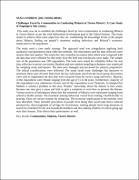| dc.contributor.author | Ssali, Andrew | |
| dc.date.accessioned | 2018-11-02T07:10:57Z | |
| dc.date.available | 2018-11-02T07:10:57Z | |
| dc.date.issued | 2011 | |
| dc.identifier.citation | Ssali, A. (2011). Challenges Faced by Communities in Combating Malaria in Tororo District: A Case Study of Nagongera Sub-county. Uganda Martyrs University, Nkozi: Uganda Martyrs University. | en_US |
| dc.identifier.uri | http://hdl.handle.net/20.500.12280/824 | |
| dc.description.abstract | SSALI ANDREW (2011-MO92-40016)
Challenges Faced by Communities in Combating Malaria in Tororo District: A Case Study of Nagongera Sub-county.
This study was set to establish the challenges faced by rural communities in combating Malaria in Tororo district as per the sixth millennium development goal of the United Nations. This study aimed to achieve three main objectives that are: establishing the knowledge levels of the people about Malaria, finding out people‟s treatment seeking behaviour and Malaria‟s economic implication to the population.
The study used a case study strategy. The approach used was triangulation applying both qualitative and quantitative data collection methods. The instruments used for data collection were mainly interview guides. The researcher also consulted secondary data which were compared with the data that were collected for this study from the field and conclusions were made. The sample size of the population was 180 respondents. The tools were tested for reliability before the real data collection exercise was started. Random and non-random sampling techniques were employed for sampling study participants. The data were managed and processed for analysis preparation. The ethical considerations were followed. The study faced some challenges but measures to minimize them were devised. Data from the key informants and from the focus group discussions were used to supplement the data that were extracted from the survey using interviews. Majority of the respondents were female ranging from the age of 15 to 84 years. Furthermore, majority of the respondents were subsistence farmers and all the respondents were Christians. It emerged that Malaria is indeed a problem in this area. Peoples‟ knowledge about the disease is also scanty because one may give a cause and fails to give a symptom or even how to prevent the disease. Various sources of information about first line treatment of Malaria were mentioned ranging from school to health centres. The treatment seeking behaviour varied from visiting a health facility to praying. There are various reasons for doing that. The economic implications of the endemic were also identified. These included prevention of people from doing their usual tasks hence reduced productivity, discouragement of savings for investments, making people move long distances in search for treatment for the sick household members and also making children of school-going age miss their lessons. This affects their performance as well.
Key Words: Communities, Malaria, Tororo District | en_US |
| dc.language.iso | en | en_US |
| dc.publisher | Uganda Martyrs University | en_US |
| dc.subject | Communities | en_US |
| dc.subject | Malaria | en_US |
| dc.subject | Tororo District | en_US |
| dc.title | Challenges Faced by Communities in Combating Malaria in Tororo District: A Case Study of Nagongera Sub-county. | en_US |
| dc.type | Thesis | en_US |


